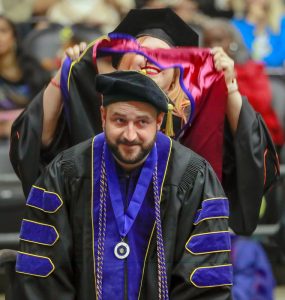Doctoral student lands criminal justice faculty position in California
A University of Arkansas at Little Rock graduate will soon be sharing his knowledge of the criminal justice system with students on the west coast.
Dr. Marc Glidden, visiting assistant professor of criminal justice, graduated May 11 with a Ph.D. in criminal justice and a tenure-track assistant professor position at California State University, Northridge.
“Criminal justice is such a developing field,” Glidden said. “Since it is such a new field of study, there will always be topics to be curious about.”
Glidden came to UA Little Rock in 2013 to pursue his doctorate. He has taught for the Department of Criminal Justice since fall 2014 and adheres to a student-centered, high-impact approach, which emphasizes active learning, critical thinking, and learning assessments.
“Now that I’ve graduated, I’m looking forward to having a successful career in academia by providing the mentorship and unique learning experience that I had throughout my education to my future students,” he said.
Since Glidden has a background in housing at East Carolina University and McKendree University, he was thrilled when an opportunity to work as the assistant director of student housing came up in 2014. He later served as the director of campus living and assistant dean of students from 2016 to 2018.
“With my interest and passion in working for students, the ability to continue working in the classroom as an adjunct instructor and also work with students in housing provided me with the opportunity to work closer with UA Little Rock students and to gain experience in the administrative part of the university as I continued to prepare to go into academia.”

The opportunity to participate in field research with criminal justice professors is an experience that Glidden says greatly enhanced his career.
“I really appreciated the one-on-one mentorship with faculty in criminal justice and the experience to get to work with Tim Brown on hands-on fieldwork. We went to prisons to conduct surveys with inmates and to rural counties to interview gang members,” Glidden said. “I can talk about research all day, but understanding that experience of how we gain knowledge about these nuanced topics in criminal justice is a unique experience in itself. Having the experience of collecting my own data before I was a professor was very valuable.”
In his dissertation, “Forget the Olive Branch, What About the Bank Branch? An Examination of the Relationship between Financial Access and Community Crime,” Glidden explored how access to banks and financial institutions in a community impacts the amount of crime from a social disorganization framework.
“Similar to churches, banks offer a platform for individuals within a neighborhood to engage in ways of forming bonds within the neighborhood,” he said. “The world runs on money. Money and currency are the basis of any society. Banks are still relevant, especially in rural communities.”
While Glidden has found that access to banks reduces crime rates in communities, he plans to conduct follow-up research to understand why.
“As the number of banks goes up, the amount of crime in a community goes down,” he said. “More research is needed to know how. This has never been looked at before.”
As he gets ready to take the next step in life, Glidden is thankful for all the people who helped him succeed at UA Little Rock.
“My favorite part about UA Little Rock is all the people I have met from colleagues in housing to students in the classroom to faculty in criminal justice,” he said. “Each has contributed to my success and my story at UA Little Rock and has made it a positive experience that I will remember for the rest of my life.”
